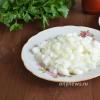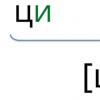Words with the prefix prev. Spelling of prefixes. Spelling "pre-" and "pri-"
Teacher's comments on the material being studied
| Possible difficulties | Good advice |
| Often the last consonant sound in an unchangeable prefix is stunned. S...crept, prescription. | The spelling of unchangeable prefixes does not depend on their sound. Snuck up, prescription. |
| Often the last consonant sound in a prefix coincides in sound with the next sound in the word. On the eve of summer, provide support. In these cases, errors may occur. | On the eve of summer, provide support. |
| There are words in which, instead of a prefix, it is possible to write the prefix sub- by mistake: po...cherk, po...slipping. In the word preliminary, the prefix pre- is sometimes mistakenly added, and the word is written with a double D. | The prefix is written in the words handwriting and slip By-. Remember the spelling of the word preliminary (it does not have a double consonant). |
| The Russian prefix can sometimes be confused with the Greek prefix peri-, which has become part of the root in some borrowed words. Periphery. Periodicity. Per... petia. | Remember the spelling of the following words: periphery periodicity peripeteia periscope |
| According to the rule, after a prefix of foreign origin, I does not change to Y. How to recognize a prefix of foreign language origin? | Remember the following prefixes of foreign language origin: super (super game); pan- (pan-Spanish); counter- (counterplay); post- (post-industrial). |
| In some cases, when after a prefix on a consonant there is a borrowed root, “the hand does not rise” to change the I to Y. Pre-infarction; S...improvise; With...simulate. | Follow the rules. Pre-infarction; Improvise; Simulate. |
| What is the correct spelling: to collect or to take? | The word levy is written with an I. Collect taxes. Do not confuse it with the word take. |
| Before the consonant CH, sometimes you want to write the letter Z in the prefix. Be...honest. And... disappear. Damn... crazy. Chere... stripe. In such cases, errors may occur. | Before the letters denoting voiceless consonants, the voiceless consonant S should be written in the prefix. Dishonest. Disappear. Too. ChereStripe. |
| In a word tasteless the letter B, standing at the beginning of the root, denotes a dull consonant, and doubts arise about which consonant to write in the prefix - Z or S. | Remember: in the word tasteless the letter Z should be written in the prefix. |
| Sometimes the last consonant sound in a prefix merges with the next sound in the word. World... vision, in... calling, rise... up, spread, uncountable. In these cases, errors may occur. | Do not forget to write a double consonant at the junction of the prefix and the root if adjacent consonants merge in sound. Worldview, appeal, uprising, spread, countless. Distinguish from similar examples cases in which a double consonant is not formed at the junction of the prefix and the root. Melt. Expand. Straighten, etc. |
| Calculation, calculation, calculation, calculation, calculation. | Pay special attention to the spelling of the words calculation and calculate. The word calculation and all words derived from it are written without a double consonant. Calculating, calculating, calculating, calculating. |
| In the Russian language there are prepositions THROUGH, WITHOUT, FROM, which are written with words separately and only with the letter Z. No... sense, no... sense. And... under the fence, and... under the foreheads. And... under the canopy, and... under the cover. Chere... saddle, cher... saddle. | Such prepositions must be distinguished from prefixes. Without meaning, but meaningless. FROM under the fence, but also from under the brows. FROM under the canopy, but also on the sly. Through the saddle, but through the saddle. |
| In Russian, NIZ can be not only a prefix, but also a root. The letter Z is always written at the root -niz-. No...falling curls, no...earnings. Reduce…walking capacity, low…calorie. | The root –niz- should be distinguished from the prefix NIZ (C)-. Low curls, low earnings. Relaxing, low calorie. |
| Often there is a temptation before a consonant denoting a voiced sound to replace the prefix S- with Z. Not...a flammable cabinet. ...move. ...press in hand. | The prefix C- is unchangeable. It should never be changed to Z. Safe. Move it from its place. Squeeze in your hand. Remember the spelling of words here, the building, the health, you can’t see a thing. In these words the prefix C- is not used. |
| The main difficulty in spelling prefixes pre- And at- is that most spellings need to be memorized. The scope of the rule is very limited. | Read the reference materials carefully. Contact them every time you have a problem. |
Spelling of immutable prefixes
It's leaking; pr..grandfather; per..equip; d..they said.
Most prefixes in Russian are unchangeable, i.e. Regardless of the sound in one position or another, they are written uniformly. The spelling of such prefixes should be remembered. For a list of unchangeable prefixes, see the table:
| called out, stop, sediment, go numb |
||
| TO- | get there, get there, guess |
|
| BY- | belief, courtyard, cut, rely |
|
| PRO- | boil, gap, trick, grow |
|
| PRA- | In a special meaning: great-grandmother, proto-language |
|
| ON- | attack, cover, overtake |
|
| FOR- | wonder, prisoner, pick up, hammer |
|
| OVER- (NADO-) | bite, crack, inscribe, tear |
|
| UNDER- (UNDER-) | melt, sharpen, suggest, wait |
|
| OT- (OTO-) | give away, rest, move aside, open |
|
| OB-(OBO-) | trim, grind, wipe, go around |
|
| V- (VO-) | to your heart's content, to sew in, to cling to, to involve |
|
| PRE- | chairman, predecessor, predetermine |
|
| RE- | humus, overflow, distortion |
|
| C- (CO-) | move get lost save give up make friends do bend over | There is no prefix in the words: Here, local, building, health, no way and cognates. |
It flows - an unchangeable prefix UNDER-.
Grandfather - unchangeable prefix PRA-.
First equip - unchangeable prefix RE-.
D about said - unchangeable prefix TO-.
Prefixes PRE- and PRI-
It is clear that it is impossible to draw up a clear rule for all cases. Therefore, the spelling rule proposed below is suitable mainly for words in which the meaning of the prefix is clearly guessed.
| Let's remember some cases: |
|
| give shape, shine ignore bride's dowry chapel of the temple radio susceptible gatekeeper close the window arrive at the train arrival hold the door open with a stick lean your head to your shoulder bow at the door look after an orphan get down to business impregnable bastion visiting doctor make an effort downplay (reduce a little) put a chair stick to inapplicable technique tolerate difficulties pester with questions at attend the meeting | betray a friend, dreams bury old legend limit of patience successor manager continuity of generations misconception, vicissitudes of fate bring ideas to life be on vacation residence bicker over trifles bow your head in respect, adamant person, old age, bow to talent despise cowards break the law criminal has enduring significance immutable law downplay (reduce significantly) repose (die) stumbling block an indispensable condition undergo hardships, changes unceasing, unceasing |
Choice of prefixes Z or C
In the Russian language there are prefixes in which letters alternate Z And WITH:
WITHOUT- / BES- , RAZ- / RAS-, WHO- / VOS- (VZ- / VS-), IZ- / IS-, NIZ- / NIS-, THROUGH- / THROUGH- (THROUGH- / THRASS-)
In..click; walking along; ..do; burn..burn.
The choice of consonant is carried out according to the following rule:
In with click - after WITH there is a voiceless consonant.
Not walking - after WITH there is a voiceless consonant.
Make - a word with an invariable prefix WITH-.
Once to burn - after Z there is a voiced consonant.
Prefixes with fluent vowels
From..take; over..tear; once..send.
In some cases (usually when consonants coincide at the beginning of a root), for euphony, a vowel is added to prefixes ending in a consonant ABOUT.
Raise - call;
open - move away.
select; tear; send out.
Selecting I or Y after prefixes ending in a consonant
Not without..famous; counter..gra; super..interesting.
After a prefix ending in a consonant, the letter following it AND changes to Y.
| Search - find Initiative - lack of initiative Skillful - artless |
Well-known - after a prefix on a consonant AND changes to Y.
Counter and gra - after the prefix of foreign language origin of the shift AND on Y doesn't happen.
Super and interesting - after the super-shift prefix AND on Y doesn't happen.
E.A. Makovey, Russian language teacher, Municipal Educational Institution Secondary School No. 1, Adygeisk,
A.I. Arkhipova, professor of Kuban State University
§ 2. Spelling of prefixes
Prefix, prefix (from lat. praefixus“attached in front”) is the part of the word before the root. In Russian words, there can be from 1 to 3 prefixes before the root: tremble, join, open. Most Russian prefixes coincide in form and partly in meaning with prepositions (bezdorozhny - without a road, verbal - from the verb, from below, from under the forehead - from under the forehead), particles (not appearing - not to appear). Among the prefixes of the Russian language there are a number of borrowed ones: A in the meaning of “not”, anti - “against”, archi - “very”, counter - “against”, pan - “all”, sub - “under”, trans - “through” etc.
2.1. Spelling of immutable prefixes
Most prefixes in Russian are unchangeable, i.e. Regardless of the sound in one position or another, they are written uniformly. The spelling of such prefixes should be remembered. For a list of unchangeable prefixes, see the table:
|
called out, stop, sediment, go numb |
||
|
get there, get there, guess |
||
|
belief, courtyard, cut, rely |
||
|
boil, gap, trick, grow |
||
|
In a special meaning: (meaning of kinship) great-grandmother, proto-language |
||
|
attack, cover, overtake |
||
|
wonder, prisoner, pick up, hammer |
||
|
OVER- (NADO-) |
bite, crack, inscribe, tear |
|
|
UNDER- (UNDER-) |
melt, sharpen, suggest, wait |
|
|
OT- (OTO-) |
give away, rest, move aside, open |
|
|
OB-(OBO-) |
trim, grind, wipe, go around |
|
|
V- (VO-) |
to your heart's content, to sew in, to cling to, to involve |
|
|
PRE- |
chairman, predecessor, predetermine |
|
|
RE- |
humus, overflow, distortion |
|
|
C- (CO-) |
move
|
There is no prefix in the words: |
2.2. Spelling of prefixes in ...z - ...s
In the Russian language there are prefixes in which letters alternate Z
And WITH
:
WITHOUT- / BES- , RAZ- / RAS-, WHO- / VOS- (VZ- / VS-), IZ- / IS-, NIZ- / NIS-, THROUGH- / THROUGH- (THROUGH- / THRASS-)
In..click; walking along; ..do; burn..burn.
The choice of consonant is carried out according to the following rule:
2.3. Spelling of prefixes PRE- and PRI-
Words starting with pre- And at-, have different origins in the Russian language.
Some came from Latin. In such words the Latin prefix prae- became part of the Russian root (president, presidium, presumption, predicate, bonus, claim, applicant, prefect, precedent, preparation, presentation). The Russian language also borrowed Latin words with a root beginning with pri (priority, privilege, private).
Others are of Old Slavonic origin. They are characterized by the Slavic prefix pre-, which is often included in the modern root (obstacle, repose, advantage, beautiful). In the language, these words retain their bookish character.
Finally, many words with pre- And at- are actually of Russian origin.
It is clear that it is impossible to draw up a clear rule for all cases. Therefore, the spelling rule proposed below is suitable mainly for words in which the meaning of the prefix is clearly guessed.
|
Let's remember some cases: |
|
|
give shape, shine
|
betray a friend, dreams
|
2.4. Spelling of vowels in the prefixes NE- and NI- in
indefinite and negative pronouns,
pronominal negative adverbs.
Note.The rule applies to words of other parts of speech if they are formed from negative pronouns and adverbs: idleness, insignificant, worthless, worthless, draw.
2.5. Spelling of consonants at the junction of prefix and root.
Pere + skaz = retelling (-s-)
ras + skaz = story (-ss-)
race + quarrel = quarrel (-ss-)
Remember:calculation (calc + even), but: calculate (calc + count);
uncountable (bes + s + even).
In words to tear apart, to tear apart, to ruin one 3 is written.
The Russian language is incredibly rich and partly thanks to morphemes, which, participating in word formation, create new words. Prefix, aka prefix, is the most important morpheme, without whose existence half of the words would disappear. It is placed before the root and the number of this morpheme in a word can reach three units!
Classmates
Many prefixes in the Russian language are formed from synonymous prepositions. For example: word verbal formed from the combination of a preposition with a noun, from a verb. Some of them are borrowed from other languages. For example, morpheme "anti-" means “opposite” or “hostility”. To be literate and educated person, you need to know not only the spelling of prefixes, but also their meaning. These morphemes in the Russian language can be unchangeable or changeable in form.
Immutable prefixes
Even without memorizing the entire list, it is incredibly difficult to make a mistake when writing immutable prefixes. They are spelled the same under any circumstances, regardless of whether there is a vowel or consonant after them, a voiceless sound or a voiced sound.
- "O-", for example: call out, turn around, look around;
- "to-", for example: get there, run, swim;
- "By-", for example: comprehend, fry, gradually;
- "pro-", for example: lie down, climb, run;
- "great-", for example: great-grandmother, great-grandfather, Proto-Slavic (the prefix is used if the word has the meaning of kinship, original and ancient);
- "on-", for example: raid, attack, people;
- "for-", for example: shoot, record, run;
- “over-” (“need-”), for example: to tear, to laugh at, to milk;
- "under-" ("under-"), for example: window sill, undermine, prompt;
- "from-" ("from-"), for example: sharpen, tear off, bend;
- "ob-" ("ob-"), for example: torn, sprinkled, bypass;
- "in-" ("in-"), for example: to grasp, to break in, to enter;
- "pre-", for example: harbinger, pre-spring, precede;
- "re-", for example: move, move, wait;
- "s-" ("co-"), for example: drive away, run away, move.
It is worth noting that the prefix “z-” does not exist in Russian. At the beginning of a word, the letter “z” is placed before a consonant in only a few words: building, here, local, health, not visible in sight.
Changeable

Remember how they written quite easily. It is important to look at the letter that begins the root that follows the first morpheme. If the sound is voiced, then the prefix will end in a voiced consonant. If the sound is dull, then its ending will be dull.
Important to know, that this rule does not apply to words in which the prefix is unchangeable: surrender and group.
 “Not-” and “neither” are used most often in negative and indefinite pronouns, as well as negative adverbs formed from pronouns. Determining which vowel letter will be used is quite simple. If the morpheme is stressed, then we write “e,” but if the prefix is unstressed, we write “and.”
“Not-” and “neither” are used most often in negative and indefinite pronouns, as well as negative adverbs formed from pronouns. Determining which vowel letter will be used is quite simple. If the morpheme is stressed, then we write “e,” but if the prefix is unstressed, we write “and.”
For example: someone - no one, something - nothing, once - never, etc.
This rule applies to words of other parts of speech only if they are formed from negative pronouns or adverbs. For example: insignificant, worthless.
Spelling "pre-" and "pri-"
"Pre-" And "at-" perhaps the most difficult to write, because you need to know all their meanings.
Let's start with "pri-". It has the following meanings:
- The meaning of proximity. Come, come running.
- Meaning incompleteness of action. Tap, stamp.
- Meaning joining and fastening. Flatten, solder, sew.
- Meaning close location, adjacent to something, neighborhood. Suburb, coastal.
“Pre-” is used in cases where:
- Means high degree or quality. You can test yourself by replacing it with the word “very”. Most interesting (very interesting), very pretty (very pretty).
- It means “through” and synonymous with "re-". Criminal (i.e. a person who has become confused by the law), transformation.
You should carefully analyze the word to avoid mistakes, because depending on which letter is used, the meaning of the words will change. Betray a friend, but give meaning. Stay in the country, but arrive in the country. Bow at the door, but bow to talent.
This rule is also difficult because as a result of borrowings Words have appeared in our language, the meaning of which is not always easy to understand. Here are some of them: preamble, prerogative, precedent, primitive.
Foreign language prefixes
Studying the meaning of certain foreign language parts of a word is not only incredibly useful, but also interesting. Most of them were borrowed from Latin and Greek.
- "A-" has a negative value and indicates the absence of some characteristic. Achromatism, illogical, immoral;
- "Anti-" is used in Russian to form words, meaning opposites. Anti-scientific, anti-bacterial, anti-virus;
- The morpheme has the meaning of the highest degree and superiority "archi-". Archpastor, archpastor;
- Using a set-top box "hyper-" indicate exceeding the norm. Hyperactivity, hypersensitivity;
- "Dis-"(used before vowels) and "dis-"(used before consonants) carry the meaning of separation and negation. Imbalance, disharmonize;
- Borrowed "counter-" synonymous with the Russian prefix against. Counter-offensive.



















